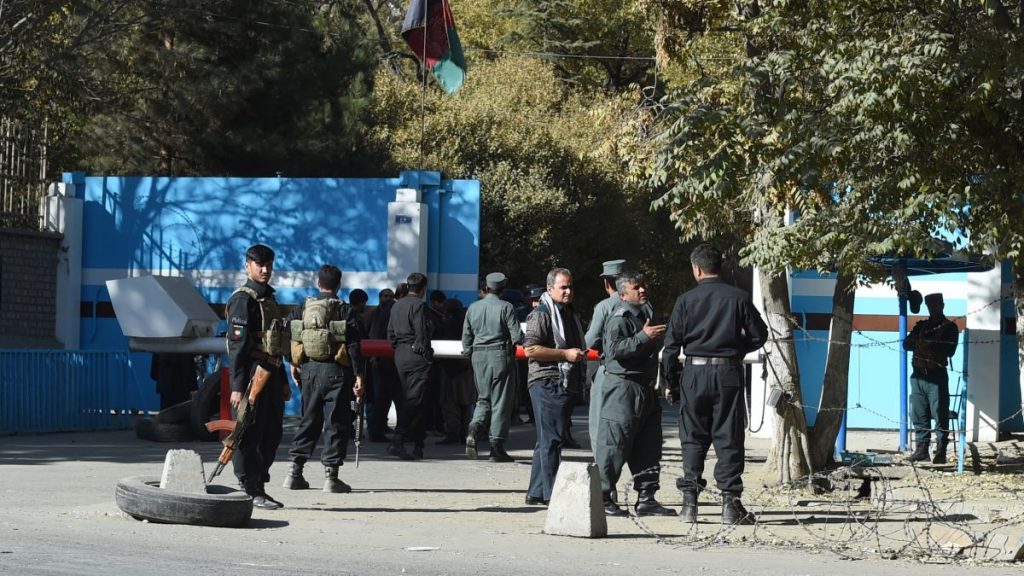Manas Dasgupta
NEW DELHI, Nov 2: In one of the bloodiest terror attack on an educational institution, at least 25 people were killed and 12 others wounded as gunmen stormed Kabul University in Afghanistan on Monday.
Tariq Arian, spokesperson for the Afghanistan Interior Ministry, told media persons that three persons were involved in the attack. “One of them blew up his explosives at the beginning and the two remaining were brought down by the security forces.”
According to Arian, the attack ended only after six hours when the three attackers were killed.
It’s not clear as to who is behind the attack yet, as no group has taken responsibility so far. But Taliban, who are currently engaged in peace talks with the Afghan government being held at Doha, Qatar, has denied their involvement in the attack. The authorities suspect it to be the work of Islamic State group.
Media reports from Kabul said gunmen the university as it hosted a book fair attended by the Iranian ambassador to Afghanistan, sparking an hours-long gun battle at the war-torn country’s largest school.
The peace talks with the U.S.-backed government being held at Doha aim to help the U.S. finally withdraw from America’s longest war, though daily bloodshed continues and an Islamic State affiliate launches its own attacks on Shiites in the country.
Five hours into the fighting, sporadic grenade explosions and automatic weapons fire echoed down the empty streets surrounding the university’s fenced compound. Afghan troops stood guard. Earlier, students were seen fleeing for their lives from the site.
Ahmad Samim, a university student, told journalists he saw militants armed with pistols and Kalashnikov assault rifles firing at the school, the country’s oldest with some 17,000 students. He said the attack happened at the university’s eastern side where its law and journalism faculty teach.
The book fair, according to Iranian media, were inaugurated by the Iranian Ambassador Bahador Aminian and cultural attaché Mojtaba Noroozi. The book fair was scheduled to host some 40 Iranian publishers. Iranian state television reported the attack occurred, but did not offer information on its officials.
Iranian diplomats have been targeted previously by attacks in the country and nearly sparked a war between the two countries. In 1998, Iran held the Taliban responsible for the deaths of nine Iranian diplomats who were working in its consulate in northern Afghanistan and sent reinforcements to the 950-kilometer long border that Iran and Afghanistan share.
Last month, the Islamic State group sent a suicide bomber into an education center in the capital’s Shiite dominated neighborhood of Dasht-e-Barchi killing 24 students and injuring more than 100. The Islamic State affiliate groups in Afghanistan have declared war on Afghanistan’s minority Shiite Muslims and have staged dozens of attacks since emerging in 2014.
Schools have been targeted for attacks in the past as well. Last year, a bomb outside of the Kabul University campus’ gates killed eight people. In 2016, gunmen attacked the American University in Kabul killing 13.
Consequent to the terror attacks in France, Canada and armed attack in Kabul, the United Nations threats and security agency has assessed that the threat posed by extremists and lone-wolf attacks could increase.
In a security advisory issued by its regional office in Bangkok, the UN’s department of safety and security asked UN personnel, particularly those of French nationality to remain alert about their surroundings.
The advisory, which noted that the threat could extend to commercial or educational institutions perceived to be linked to France, also asked all staffers to consider the time they spent in locations associated with French interests.
“It must be noted that factors such as appearances or spoken language in themselves do not denote nationality, and the outspoken threats against French nationals is assessed as having a potential to collaterally affect other nationalities as well,” according to the advisory.
The UN safety department’s Threat and Risk Assessment Service (TRS) said there had been an observed increase in anti-Western sentiment and anti-France rhetoric across pre-dominantly Muslim States, including the Asia-Pacific region including Bangladesh, Pakistan, Afghanistan, Uzbekistan, Tajikistan, Kyrgyz Republic, and Indonesia.
There have been calls for attacks against French assets by extremist groups such as Islamic State and al-Qaeda. In Bangladesh, there have been large-scale protests against France president Emmanuel Macron’s support for freedom of expression in the context of the murdered school teacher showing a cartoon of Prophet Mohammad to his students.
In Pakistan, Prime Minister Imran Khan led the pitch, accusing French President of “attacking Islam” and of “creating further polarisation that would in turn lead to further radicalization.” Pakistan’s Foreign Office also issued a statement condemning “systematic Islamophobia campaign” under the “garb of freedom of expression,” it said.
The Ministry of Religious Affairs had also announced country-wide celebrations as part of Ashiq-e-Rasool (Love for Prophet Muhammad) from 30 October to 6 November. As part of these celebrations, small to medium scale public gatherings, religious conferences protest rallies were being held by the government.
India had last week come out in support of the French president who faced vicious attacks after he spoke in favour of the freedom of expression. “We strongly deplore the personal attacks in unacceptable language on president Emmanuel Macron in violation of the most basic standards of international discourse. We also condemn the brutal terrorist attack that took the life of a French school teacher in a gruesome manner that has shocked the world. We offer our condolences to his family and the people of France,” the Indian foreign ministry said in a statement last week.

